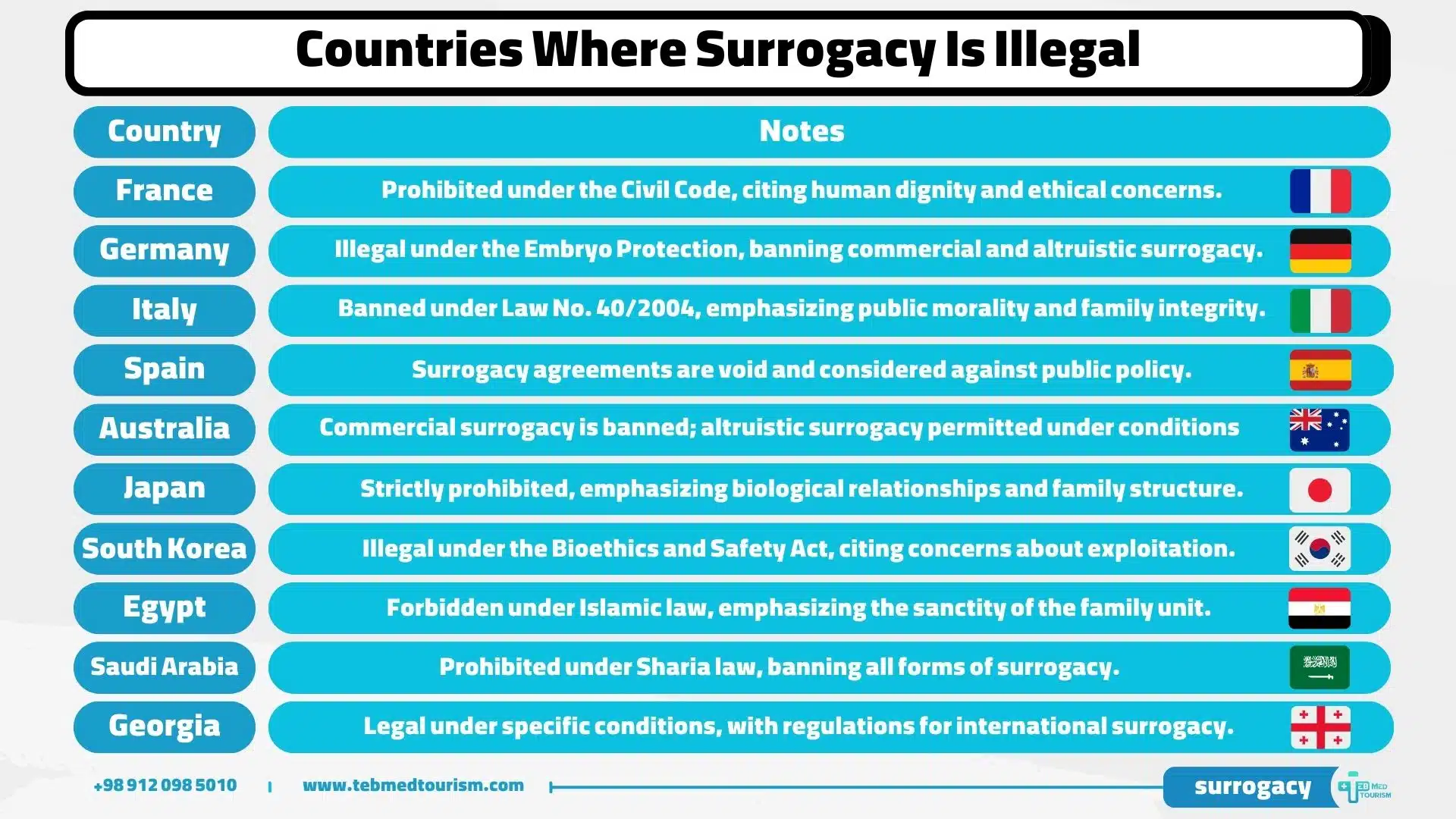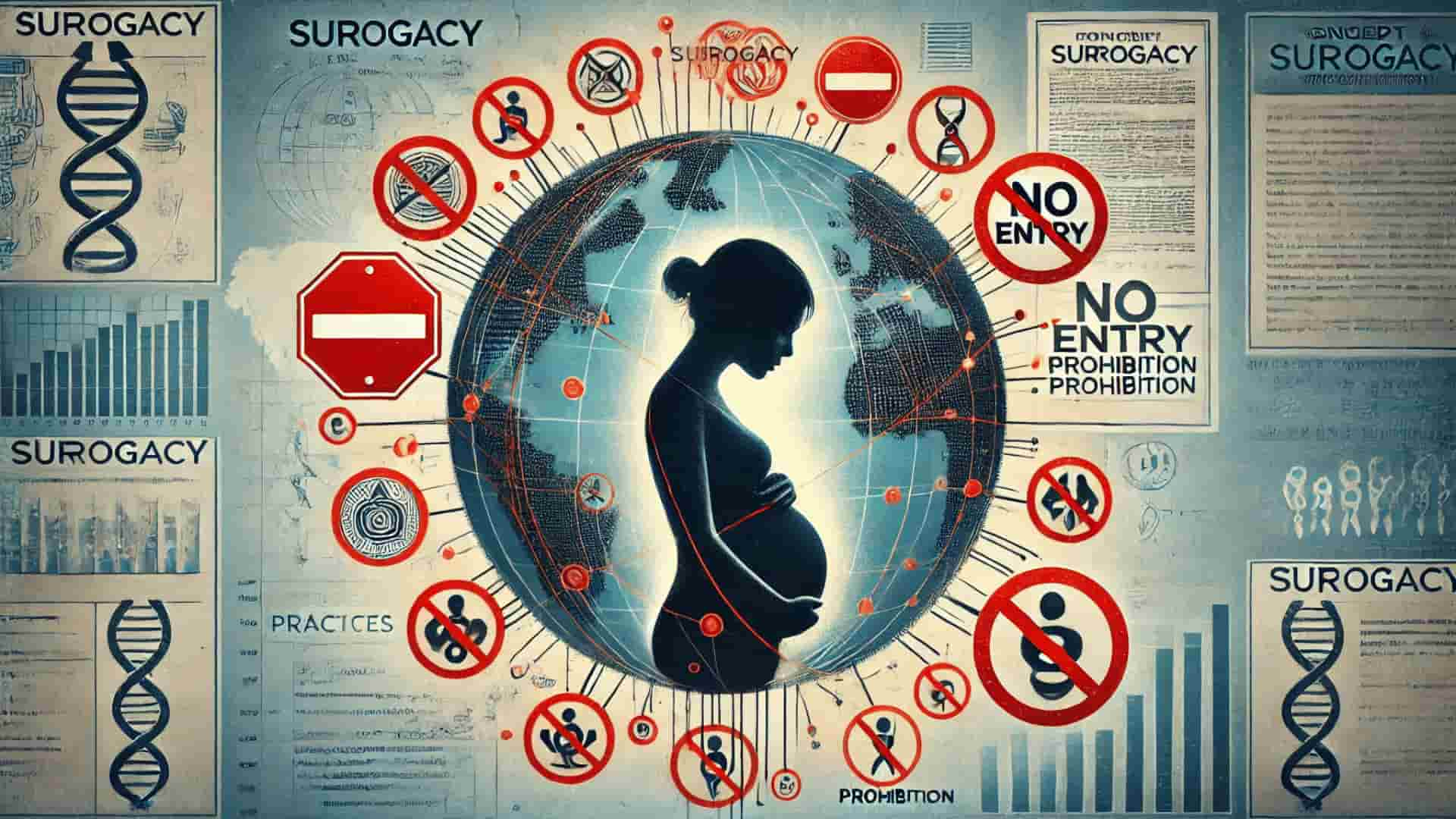Surrogacy, a process in which a woman carries and delivers a child on behalf of another individual or couple, has become a transformative option for those facing infertility or other medical challenges preventing pregnancy.
However, it is crucial to understand where surrogacy is illegal, as the practice faces varying levels of acceptance around the world.
As of 2024, some countries have embraced it with regulated frameworks, while others have prohibited it entirely, citing moral, religious, and societal concerns.
Understanding where surrogacy is illegal requires examining these diverse perspectives and the legal systems that enforce them.
This global patchwork of acceptance and prohibition highlights the complexities surrounding the practice and its implications for intended parents and surrogates alike.
Countries Where Surrogacy Is Illegal
Surrogacy laws vary widely across the globe, with some countries explicitly prohibiting the practice due to cultural, ethical, or legal considerations.
Here’s a look at some of the countries where surrogacy is illegal, along with the reasons for its prohibition and any associated legal conditions:

France
Surrogacy is prohibited in France under the Civil Code, which asserts that every child must have a biological connection to its mother.
The French government has strong ethical objections to surrogacy, viewing it as a potential form of exploitation for women and a violation of human dignity.
The law also emphasizes the importance of protecting children from being considered as commodities. In France, the desire for children through alternative reproductive methods is generally countered by promoting adoption and fostering.
Germany
Germany prohibits all forms of surrogacy under its Embryo Protection Act. The German government has a firm stance against commercial reproduction, considering it a violation of human dignity.
Surrogacy, in both commercial and altruistic forms, is seen as a violation of the fundamental principles of bioethics.
Germany’s legal framework does not allow for third-party involvement in the creation of life, considering such arrangements as potentially exploitative for both the surrogate and the child.
The country’s legal system also does not recognize any legal parent-child relationship arising from a surrogacy arrangement. Therefore, no child born via surrogacy abroad can have the surrogate as the legal mother in Germany.
Italy
Surrogacy is illegal in Italy under Law No. 40/2004, which strictly prohibits both commercial and altruistic surrogacy arrangements.
Italian authorities view surrogacy as a violation of public morality and ethical standards, particularly because it is seen as commodifying childbirth and potentially exploiting vulnerable women.
The law also emphasizes the protection of family integrity, which is seen as disrupted by surrogacy. Additionally, the use of surrogacy is perceived to undermine the natural connection between a child and its mother, as well as the legal and biological family structure.
Spain:
Surrogacy is illegal in Spain, although there are some nuances to the law. According to Spanish legal statutes, surrogacy agreements are considered void and against public policy.
The law prohibits any form of commercial surrogacy and views it as a violation of women’s rights and the potential for exploitation.
However, Spain does allow children born through surrogacy abroad to be recognized, but only if the surrogate mother’s rights are not considered violated under Spanish law.
The Spanish government insists on ensuring that surrogacy does not involve trafficking or exploitation. Therefore, the law often involves a complex legal process for foreign surrogacy cases, including the validation of parental rights through Spanish courts.
Australia:
In Australia, surrogacy is governed by a mixture of federal and state laws. Commercial surrogacy is banned in all states and territories, but altruistic surrogacy is permitted with strict regulations. In most states, altruistic surrogacy is legal as long as there is no financial compensation beyond the surrogate’s reasonable medical and other expenses.
Surrogacy arrangements in Australia are highly regulated to ensure that no exploitation occurs. The primary legal concern is the protection of women’s rights and the welfare of the child.
States like New South Wales, Queensland, and Victoria have their own regulations regarding parental orders and legal parenthood after surrogacy arrangements. Some states, such as Western Australia, impose criminal penalties for those involved in commercial surrogacy.
Japan
Surrogacy is illegal in Japan due to the country’s strict laws governing reproductive technologies. Japan’s legal framework emphasizes the importance of biological relationships and the recognition of parenthood.
Surrogacy is viewed as a practice that undermines the traditional family structure and creates complications regarding legal parentage. Japan’s legal system does not recognize surrogate motherhood, and any child born via surrogacy abroad must undergo complex legal procedures to establish parentage.
The Japanese government strongly opposes third-party reproduction due to concerns about its ethical implications and the risks of exploitation.
South Korea:
Surrogacy is illegal in South Korea, where the Bioethics and Safety Act strictly prohibits both commercial and altruistic surrogacy arrangements.
The primary reasons for the prohibition are concerns about the potential exploitation of women as well as the complications that arise from legal parentage.
South Korean law places high importance on the legal and biological connection between parents and children, and surrogacy is viewed as disruptive to this family structure. There are also concerns about the potential commodification of reproduction.
While some South Korean couples have traveled abroad for surrogacy, they often face legal difficulties in securing parenthood upon the child’s return to South Korea. The country encourages adoption as a means of family formation rather than surrogacy.
Egypt
In Egypt, surrogacy is illegal under Islamic law, which is the foundation for much of the country’s legal system. Egyptian law prohibits both commercial and altruistic surrogacy arrangements, viewing them as incompatible with Islamic principles, particularly regarding the sanctity of the family unit.
Surrogacy is considered to undermine the traditional understanding of parenthood, which emphasizes the biological and legal connection between the child and the mother. Our article titled ‘Surrogacy in Islam‘ can help you further understand the Islamic aspect of surrogacy.
Additionally, there are concerns about the potential for exploitation, especially in terms of surrogate mothers being coerced or financially exploited. Couples who seek surrogacy often turn to other countries where the practice is permitted, such as Iran. If you want to know about surrogacy in Iran, our article ‘Surrogacy in Iran‘ will help you find the answers you’re looking for.
Saudi Arabia:
Surrogacy is strictly prohibited in Saudi Arabia under Islamic Sharia Law. The country’s legal framework, based on Sharia principles, forbids all forms of surrogacy, both commercial and altruistic.
The prohibition is rooted in religious and ethical concerns, particularly around the preservation of the family structure and the prohibition of third-party involvement in childbirth.
In Saudi Arabia, the notion of a child’s lineage is tied to its biological and legal mother, and surrogacy is seen as conflicting with these fundamental principles. Additionally, surrogacy is considered exploitative, and the country’s laws prioritize the protection of women’s rights.
Those seeking surrogacy in Saudi Arabia often face legal and social consequences, and many turn to countries where surrogacy is legal.
Georgia:
Surrogacy in Georgia is legally allowed, and the country has become one of the most popular destinations for international surrogacy. Both commercial and altruistic surrogacy are permitted, making Georgia one of the few countries with a regulated and widely practiced surrogacy program.
However, there are specific conditions that foreign intended parents need to be aware of. For foreigners, the law stipulates that the surrogate mother must be from another country, not Georgia.
This means that while Georgia is open to international surrogacy arrangements, the surrogate mother must come from outside the country. Additionally, foreign parents must follow a strict legal process to establish parental rights and ensure that the child’s parentage is recognized once born.
It’s important to note that since the surrogate must be from another country, she will return to her home country after the pregnancy begins, and there will be no monitoring of her during most of the pregnancy. This means that intended parents must rely on their agreement with the surrogate to ensure that everything proceeds smoothly.
While this arrangement has advantages, it also means that intended parents must be prepared for limited direct oversight during the pregnancy phase.
FAQs
Where Is Surrogacy Legal in Europe?
Surrogacy laws vary across Europe, with some countries allowing it under specific conditions and others banning it entirely.
Countries like Georgia, Ukraine, and Russia have clear legal frameworks supporting surrogacy, often available for international parents under strict regulations. In Greece, altruistic surrogacy is permitted for citizens and residents, requiring court approval.
Meanwhile, Portugal and the Netherlands allow limited surrogacy with restrictions, primarily favoring altruistic arrangements.
However, countries like France, Germany, Italy, and Spain prohibit all forms of surrogacy or declare surrogacy contracts void. It’s crucial for intended parents to research the legal requirements and parental rights in both the surrogacy destination and their home country before proceeding.
Which Countries Allow Legal Commercial Surrogacy?
Commercial surrogacy is legal in several countries, but the regulations and eligibility requirements vary widely. Countries like the United States, Ukraine, Georgia, Russia, and Kazakhstan allow commercial surrogacy under specific legal frameworks.
In the United States, the legality depends on the state, with some having well-established laws to protect all parties. Ukraine, Georgia, and Russia permit commercial surrogacy for heterosexual married couples, with clear legal processes to establish parentage.
Kazakhstan also supports commercial surrogacy with specific conditions for both surrogates and intended parents. While India, Laos, and Thailand have historically been popular surrogacy destinations, recent legal changes have limited their accessibility.
India now allows only altruistic surrogacy for residents, and Thailand has shifted to altruistic surrogacy exclusively for Thai citizens. It’s crucial to consult legal experts and understand the local laws before pursuing surrogacy in any country.













